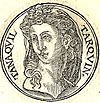The list below includes Roman women who were notable for their family connections, or their sons or husbands, or their own actions. In the earlier periods, women came to the attention of (later) historians either as poisoners of their husbands (a very few cases), or as wives, daughters, and mothers of great men such as Scipio Africanus. In later periods, women exercised or tried to exercise political power either through their husbands (as did Fulvia and Livia Drusilla) or political intrigues (as did Clodia and Servilia), or directly (as did Agrippina the younger and later Roman empresses). Even the Severan dynasty from the beginning to the end was completely dominated by four powerful and calculating women.
This is a dynamic list and may never be able to satisfy particular standards for completeness. You can help by adding missing items with reliable sources.During the Roman Kingdom
| Name | Image | Dates | Details |
|---|---|---|---|
| Rhea Silvia | 
|
c. 700s BC | A Vestal Virgin who got pregnant by Mars, she gave birth to the twins Romulus and Remus, who went on to found the city of Rome. |
| Hersilia | 
|
c. 700s BC | Wife of Romulus and following the abduction of the Sabine women, helped end the conflict between the Romans and Sabines. |
| Tarpeia | 
|
c. 700s BC | The daughter of the Roman commander Spurius Tarpeius. She was a Vestal Virgin who betrayed Rome to the Sabines at the time of their women's abduction. |
| Lucretia (Queen of Rome) | c. 700s–600s BC | The second wife of Roman King Titus Tatius. | |
| Tanaquil | 
|
died c. 575 BC | Tanaquil came from a powerful Etruscan family and was Queen of Rome through her marriage to Lucius Tarquinius Priscus, Rome's fifth King. |
| Tarquinia | c. 600s–500s BC | Tarquinia was the daughter of Rome's fifth King, Lucius Tarquinius Priscus, and his wife Tanaquil. | |
| Tullia Major | died c. 535 BC | First daughter of king Servius Tullius. She was assassinated by her husband and younger sister. | |
| Tullia Minor | 
|
died after 509 BC | Second daughter of king Servius Tullius. She killed her husband, sister, and father, and became the last Queen of Rome. She and her family were exiled after Lucretia's suicide and the overthrow of the monarchy. |
| Lucretia | 
|
died c. 510 BC | Lucretia was a noblewoman whose rape and eventual suicide led to the overthrow of the Roman monarchy. |
During the Roman Republic
- Valeria, the name of the women of the Valeria gens
- Valeria, first priestess of Fortuna Muliebris in 488 BC
- Aemilia Tertia (с. 230 – 163 or 162 BC), wife of Scipio Africanus and mother of Cornelia (see below), noted for the unusual freedom given her by her husband, her enjoyment of luxuries, and her influence as role model for elite Roman women after the Second Punic War. Her date of birth, marriage, and death are all unknown. Her husband's birth and death dates are also not known precisely, but approximated.
- Cornelia (с. 190s – c. 115 BC), virtually deified by Roman women as a model of feminine virtues and Stoicism, but never officially deified. The first Roman woman, whose approximate birth year and whose year of death is known, thanks to a law she had passed to allow her granddaughter to inherit.
- Publilia (1st century BC), the name of a woman of the gens Publilius. She was killed in 154 BC for poisoning her husband, the consul of the preceding year.
| Name | Image | Dates | Details |
|---|---|---|---|
| Cornelia | 
|
c. 190s – c. 115 BC | Daughter of Publius Cornelius Scipio Africanus, the hero of the Second Punic War. She was the mother of the Gracchi brothers, and the mother-in-law of Scipio Aemilianus. |
| Servilia | 
|
100 BC – after 42 BC | The mother of Roman politician Brutus and a lover of Julius Caesar, whom her son would later assassinate. |
During the Classical Roman Empire
- Agrippina the Elder (c. 14 BC – AD 33), wife of Germanicus, granddaughter of Augustus, mother of emperor Caligula and Agrippina the Younger (below)
- Agrippina the Younger (1st century), niece and wife of emperor Claudius, mother of emperor Nero; held up as a bad example.
- Aurelia (1st century BC), mother of Julius Caesar
- Antonia the Elder (1st century BC), grandmother of Emperor Nero
- Antonia Minor (1st century BC – 1st century AD), mother of Emperor Claudius and Germanicus, favorite niece of Augustus Caesar, considered a role model for women in the Roman Empire after she refused to remarry and spent the rest of her life raising her children and grandchildren.
- Atia, mother of Augustus and Octavia Minor
- Claudia Pulchra, wife of Publius Quinctilius Varus
- Claudia Marcella, nieces of Caesar Augustus
- Domitia Lepida the Elder, aunt of Emperor Nero
- Domitia Lepida the Younger, sister of the following, Mother of the Empress Valeria Messalina
- Domitia Longina, wife of Emperor Domitian
- Domitia Calvilla, mother of Emperor Marcus Aurelius
- Domitia Paulina, Aelia Domitia Paulina, Julia Serviana Paulina, female relatives of Emperor Hadrian
- Julia the Elder, daughter of Augustus
- Julia Livia (1st century), granddaughter of Emperor Tiberius
- Livia Drusilla (1st century BC), wife of Tiberius Claudius Nero, mother of the Emperor Tiberius, and then wife of Augustus Caesar.
- Livilla (1st century), granddaughter of Livia
- Valeria Messalina, Emperor Claudius' wife, notorious for her promiscuity.
- Octavia the Younger, sister of Caesar Augustus and fourth wife of Marcus Antonius (Mark Antony)
- Plautia Urgulanilla, Emperor Claudius' first wife
- Scribonia, second wife of Augustus and mother of his only legitimate child (whom she apparently ignored until her exile)
- Vipsania Agrippina, first wife of Tiberius and the only one he loved
- Vipsania Julia (19 BC – c. AD 29), granddaughter of Augustus
- Claudia Metrodora (1st century AD), Greco-Roman public benefactor, lived on Kos.
- Lucilla, (2nd century AD) Roman Empress, failed in her coup attempt on brother Commodus.
- Aquilia Severa (3rd century), Vestal Virgin and wife of Elagabalus.
- Clodia (1st century BC), possibly Catullus's Lesbia
- Domitia Decidiana, wife of Roman General Gnaeus Julius Agricola and mother-in-law to historian Tacitus.
| Name | Image | Dates | Details |
|---|---|---|---|
| Procula | c. 1st Century AD | Wife of Pontius Pilate, the fifth governor of the Roman province of Judaea, who presided over the trial of Jesus and later ordered Jesus' crucifixion. | |
| Pomponia Graecina | died c. 83 AD | The wife of Aulus Plautius, the general who led the Roman conquest of Britain. She was speculated to have been an early Christian, and is a saint honoured by the Roman Catholic Church. | |
| Julia Domna | 
|
160 – 217 AD | Wife of Septimius Severus and Mother of Caracalla and Geta. |
| Julia Maesa | 
|
before 160 AD – c. 224 AD | Grandmother of Elagabalus and Alexander Severus. Best known for her plotting the restoration of the Severan dynasty to the Roman throne after the assassination of Caracalla and the usurpation of the throne by Macrinus. |
| Julia Soaemias | 
|
180 – 222 AD | Mother of emperor Elagabalus, she was her son's regent. After an uprising led by the Praetorian Guard, she entered the camp to protect her son, but was slain along with Elagabalus by the Praetorian Guard in 222. |
| Julia Avita Mamaea | 
|
after 180 –235 | Mother of Roman emperor Alexander Severus and remained one of his chief advisors throughout his reign. She was killed in 235 by rebel soldiers along with her son. |
| Ulpia Severina | 
|
c. 3rd Century AD | Wife of emperor Aurelian. After Aurelian's death, she briefly ruled the Roman Empire, until the new emperor, Marcus Claudius Tacitus was chosen by the Senate. |
| Galla Placidia | 
|
388–389 or 392–393 – 450 | Daughter of the Roman emperor Theodosius I. Mother to emperor Valentinian III. She became queen consort to Ataulf, king of the Visigoths from 414 until his death in 415, and briefly empress consort to Constantius III in 421. |
See also
- Women in Ancient Rome
- List of Vestal Virgins
- List of archaeologically attested women from the ancient Mediterranean region
References
- Dion.Hal. 8.55.4; cf. 8.39-55 Broughton, vol I, 1951 p.19